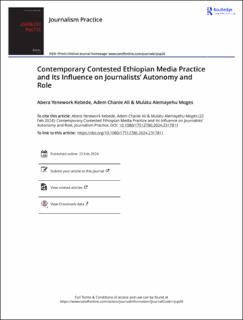| dc.contributor.author | Kebede, Abera Yenework | |
| dc.contributor.author | Ali, Adem Chanie | |
| dc.contributor.author | Moges, Mulatu Alemayehu | |
| dc.date.accessioned | 2024-02-23T07:28:43Z | |
| dc.date.available | 2024-02-23T07:28:43Z | |
| dc.date.created | 2024-02-22T14:31:57Z | |
| dc.date.issued | 2024 | |
| dc.identifier.citation | Journalism Practice. 2024, 1-29. | en_US |
| dc.identifier.issn | 1751-2786 | |
| dc.identifier.uri | https://hdl.handle.net/11250/3119499 | |
| dc.description.abstract | This study explores contemporary journalists’ autonomy and role in the Ethiopian contested media practice by taking journalists working in Amhara Media Corporation (AMC). A qualitative research approach was used to collect data from journalists and admin staff. For triangulation, this study combined document analysis and observation. Fourteen in-depth interviews were conducted with purposively selected journalists and admin staff. The interviews used semi-structured and open-ended questions that would allow journalists to reflect their perspectives freely. The study applied the Hierarchy of Influences Model to examine the data and support discussion. The findings of this study clearly signify that partisanship among journalists, the politicization of journalism, and flip-flop media practices prevail. The outsourced programs are used as a tool for silencing journalists from working independently. The journalists’ safety anxiety is the grim reality at AMC. As a result, journalists’ professional content productions and autonomies specifically on political and sensitive issues were negotiated or interfered. It is therefore challenging to maintain complete professional autonomy in order to be impartial, unbiased, and independent while working as a journalist in Ethiopia. It is recommended that the regional and federal governments should allow media independence and journalists’ autonomy in the Ethiopian media industry. | en_US |
| dc.language.iso | eng | en_US |
| dc.rights | Navngivelse 4.0 Internasjonal | * |
| dc.rights.uri | http://creativecommons.org/licenses/by/4.0/deed.no | * |
| dc.title | Contemporary Contested Ethiopian Media Practice and Its Influence on Journalists’ Autonomy and Role | en_US |
| dc.type | Journal article | en_US |
| dc.type | Peer reviewed | en_US |
| dc.description.version | publishedVersion | en_US |
| cristin.ispublished | true | |
| cristin.fulltext | original | |
| cristin.qualitycode | 1 | |
| dc.identifier.cristin | 2248889 | |
| dc.source.journal | Journalism Practice | en_US |
| dc.source.pagenumber | 1-29 | en_US |

